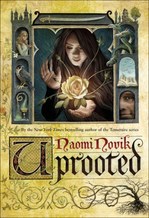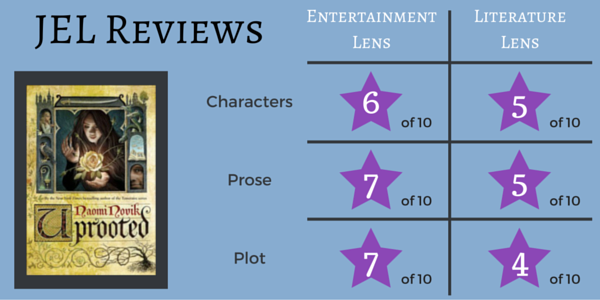Paul and I joined Tubby & Coo’s Fantasy Book Club, forcing me to be a better human and read at least one fantasy book a month. To capitalize on that opportunity, I’ll be writing reviews of each book as we go!
Be warned: I’m a forgiving reviewer. When you come here, you will not find me eviscerating novels. I’ll point out what I liked and what I didn’t like, and I’ll root everything in what it is—my opinion—rather than some self-ordained conception of what is “good” and “bad.”
I also plan to break each review into two sections: one for those who haven’t read the book, and one for those who have read the book. And I’ll rate (1) characters, (2) prose, and (3) plot through two lenses—entertainment and literature. (Basically, how I felt about it while I was reading, and how I felt about it when I thought about what I was reading.)
That being said, on to #JELReviews!
Be warned: I’m a forgiving reviewer. When you come here, you will not find me eviscerating novels. I’ll point out what I liked and what I didn’t like, and I’ll root everything in what it is—my opinion—rather than some self-ordained conception of what is “good” and “bad.”
I also plan to break each review into two sections: one for those who haven’t read the book, and one for those who have read the book. And I’ll rate (1) characters, (2) prose, and (3) plot through two lenses—entertainment and literature. (Basically, how I felt about it while I was reading, and how I felt about it when I thought about what I was reading.)
That being said, on to #JELReviews!
For those who haven’t read the book:

It's a fairy-tale that rocks the border between young adult and not-young-adult, which I’ve heard called “YA+” and “new adult.” Both those terminologies are odd ways of saying, “The book is easy to read but has some non-pornographic sex.”
I guess that won’t fit on a placard at a bookstore.
The Uprooted book description does what it needs to do, using the initial premise to lure the reader without spoiling the larger plot, but for me, I’d have read this book sooner if I’d realized the true locus of that plot: humanity vs. the Wood.
I guess that won’t fit on a placard at a bookstore.
The Uprooted book description does what it needs to do, using the initial premise to lure the reader without spoiling the larger plot, but for me, I’d have read this book sooner if I’d realized the true locus of that plot: humanity vs. the Wood.
While reading the book for the purposes of entertainment, it enraptured me. The plot leaps and careens like a Wild Mouse rollercoaster, taking sharp and wrenching turns—but they all made sense to me. Novik seems to want to keep readers completely off-kilter, and while many find this unsettling, overly jarring, I always enjoy when an author can make me feel as harried as the characters.
The main character, Agnieszka, tells us her story in first-person, and often, the reader understands more about what’s happening than she does. She’s a bit of a clichéd, flawless fantasy heroine, but there’s a sincere warmth to her that I enjoyed.
The supporting cast of friends and foes presents a few one-dimensionals, but overall, I saw their complexity beneath the surface. Novik used a light hand in most places, allowing the reader to feel for the depths themselves, which I far prefer to heavy-handed characterization.
Her light hand bleeds into her descriptive writing as well. Usually, I despise descriptions in books. I skip over them. I’m always more concerned with what’s happening, with what the characters are experiencing, rather than what they’re wearing or what the surrounding room looks like. In Uprooted, I rarely found myself skipping lines and paragraphs.
Especially in regards to the corrupted Wood, Novik puts every adjective and verb to work, forcing them to carry their weight and paint the scene in a few weighty words without resorting to lengthy, exact soliloquies of setting. She gives us the general feel of the environments rather than catalogs, and especially when describing the magic of the world, everything filters through the eyes of our uncultured 17-year-old woodcutter’s daughter.
The prose also has a soothing, melodic sound to it—but I did not find it particularly “quotable,” meaning, no individual sentences enraptured me or stayed with me apart from their context.
The journey of Uprooted careens wildly (yet sensibly) from one impossible situation to the next and continually surprised me (in the best way) with the paths it chose to take. The magic came off as tangible and real, and I noticed myself feeling out its boundaries, much as the narrator described. Novik's deeply visual writing summoned clear illusions of the dark and corrupted Wood, of its madness, of its magic, and helped me to feel dirt on my hands and a warm fire beside me, effectively transporting me into the heart of this excellent tale.
Would recommend!
The main character, Agnieszka, tells us her story in first-person, and often, the reader understands more about what’s happening than she does. She’s a bit of a clichéd, flawless fantasy heroine, but there’s a sincere warmth to her that I enjoyed.
The supporting cast of friends and foes presents a few one-dimensionals, but overall, I saw their complexity beneath the surface. Novik used a light hand in most places, allowing the reader to feel for the depths themselves, which I far prefer to heavy-handed characterization.
Her light hand bleeds into her descriptive writing as well. Usually, I despise descriptions in books. I skip over them. I’m always more concerned with what’s happening, with what the characters are experiencing, rather than what they’re wearing or what the surrounding room looks like. In Uprooted, I rarely found myself skipping lines and paragraphs.
Especially in regards to the corrupted Wood, Novik puts every adjective and verb to work, forcing them to carry their weight and paint the scene in a few weighty words without resorting to lengthy, exact soliloquies of setting. She gives us the general feel of the environments rather than catalogs, and especially when describing the magic of the world, everything filters through the eyes of our uncultured 17-year-old woodcutter’s daughter.
The prose also has a soothing, melodic sound to it—but I did not find it particularly “quotable,” meaning, no individual sentences enraptured me or stayed with me apart from their context.
The journey of Uprooted careens wildly (yet sensibly) from one impossible situation to the next and continually surprised me (in the best way) with the paths it chose to take. The magic came off as tangible and real, and I noticed myself feeling out its boundaries, much as the narrator described. Novik's deeply visual writing summoned clear illusions of the dark and corrupted Wood, of its madness, of its magic, and helped me to feel dirt on my hands and a warm fire beside me, effectively transporting me into the heart of this excellent tale.
Would recommend!
For those who have read the book:
Spoilers ahead!
Here, we’ll discuss my chief complaint about the book: I think it ended one page too late.
Midway on page 434 of 435, I felt so satisfied, so delighted.
"The romance was completely ancillary. Her happy ending is becoming the Woods Woman and living among the trees, and Sarkan stays away, because that’s what Sarkan would do. And sometimes, people don’t get their come-together moment. Sometimes, there’s no closure. Sometimes, people just don’t get together, and that’s fine, that’s a healthy thing to remind young-ish readers. I’m so glad that he isn’t going to--"
And then Sarkan came back.
Here, we’ll discuss my chief complaint about the book: I think it ended one page too late.
Midway on page 434 of 435, I felt so satisfied, so delighted.
"The romance was completely ancillary. Her happy ending is becoming the Woods Woman and living among the trees, and Sarkan stays away, because that’s what Sarkan would do. And sometimes, people don’t get their come-together moment. Sometimes, there’s no closure. Sometimes, people just don’t get together, and that’s fine, that’s a healthy thing to remind young-ish readers. I’m so glad that he isn’t going to--"
And then Sarkan came back.
"Come and meet my mother," I said. I reached out and took his hand.
It felt wrong. It felt like an editor tsk-tsk-tsked and said, “This is a YA-ish book. The romance has to end happily.”
That being said, I find it incredibly easy to mentally rewrite that last page, so I won’t lambast the whole book due to this one minor “meh” moment.
The themes of this book are the themes of Avatar, Pocahontas, and Ferngully—respect nature. There is more to this world than what you know. Book learning won’t get you everywhere. Keep an open mind. Sometimes, you have to fight back.
That last part particularly impressed me. Uprooted allows for some pretty complex thoughts rarely explored in this kind of fiction.
That being said, I find it incredibly easy to mentally rewrite that last page, so I won’t lambast the whole book due to this one minor “meh” moment.
The themes of this book are the themes of Avatar, Pocahontas, and Ferngully—respect nature. There is more to this world than what you know. Book learning won’t get you everywhere. Keep an open mind. Sometimes, you have to fight back.
That last part particularly impressed me. Uprooted allows for some pretty complex thoughts rarely explored in this kind of fiction.
It wasn’t that I felt squeamish about killing her. The Wood-queen deserved death and horror: she’d sowed it and tended it and harvested it by the bushel, and wanted more. … I hated her; I wanted her to burn, the way so many of the corrupted had burned, because she’d put a hold on them. But wanting cruelty felt like another wrong answer in an endless chain. … But I didn’t see anything else we could do.
That balance between justice and revenge, between compassion and realism. “I want to kill you. Killing you would be wrong. I have to kill you to protect everyone.” The coexistence of those thoughts—it’s the same as with the character of Marek (discussed below). Right and wrong—overlaid and simultaneous, neither erasing nor redeeming the other.
Sarkan
The majority of reviews I’ve read and opinions I’ve heard regarding Sarkan immediately peg him as an annoying Grumpy Cat pervert.
I respectfully and wholly disagree with that—but as I’ve already said, that doesn’t mean I support any kind of lasting relationship between him and Nieshka.
His presence in the book was enjoyable to me. I stopped reading and laughed a long while when Nieshka returns to the tower, Marek’s army at her back, and he says, caustic, “Well, you’ve certainly brought more men.” Most of the comical moments in the book surrounded him, and I needed those light-hearted and absurd breaks from the constant air of danger.
It helped that within the first chapter of our read-through, Paul drew a parallel between Uprooted and Doctor Who. So, I basically saw a combination of Severus Snape and Peter Capaldi the whole time I read.
Marek
Let me disclaim: when I say I loved Marek, I don’t mean I’ve forgotten that he tried to rape Nieshka. When I say I loved Marek, I mean that he was the most complex figure in the entirety of the book—a character who was neither straight up “good” nor “bad”—and I valued the nuance of him, rarely found in YA-ish books.
He tried to rape Nieshka, but he spent all his life trying to retrieve a mother he lost incredibly young (and likely barely remembers). He manipulated Nieshka and Kasia to his own political ambitions, but I noticed he treated Nieshka with an odd kind of trust. When she visits Kasia and Queen Hanna in the Grey Tower, he tells her the truth about the two women’s situation. (Granted, he may trust her in the same way that you’d trust a house pet—because it’s impossible to fathom betrayal from something so inconsequential and inferior—but, I felt some kind of nuance there.) He tried to seize Sarkan’s tower and kill everyone the reader likes, but, when he gets in that tomb and sees Queen Hanna isn’t Queen Hanna, he jumps in front of those kids. He was posturing for the crown, and he was trying to save the kids. He wants to steal the crown from his brother, but he’s upset when his brother dies.
He’s not a good guy. But he’s not actively evil, not purposefully malicious, and enough real-life people fall into that category, that it’s nice to see them represented in fiction.
Kasia
I loved Kasia, and I feel no need to disclaim that. The narrator’s perception of her leaked into me, and the image of her at Stashek and Marisha’s side, fighting in tournaments, acting as captain of the guard, made me blissfully happy. The pains of her life hurt me more than Nieshka’s, and her ending satisfied and delighted me more than Nieshka’s, and I wish we’d gotten to know more of her, more about her. She’s maneuvering her way through this world with just as much agency, with just as much to worry about and fight for.
Honestly, I wish the narration had split between Nieshka and Kasia—but, that might have gotten to be too large for a standalone novel, and I loved that this won’t devolve into an endless series.
The majority of reviews I’ve read and opinions I’ve heard regarding Sarkan immediately peg him as an annoying Grumpy Cat pervert.
I respectfully and wholly disagree with that—but as I’ve already said, that doesn’t mean I support any kind of lasting relationship between him and Nieshka.
His presence in the book was enjoyable to me. I stopped reading and laughed a long while when Nieshka returns to the tower, Marek’s army at her back, and he says, caustic, “Well, you’ve certainly brought more men.” Most of the comical moments in the book surrounded him, and I needed those light-hearted and absurd breaks from the constant air of danger.
It helped that within the first chapter of our read-through, Paul drew a parallel between Uprooted and Doctor Who. So, I basically saw a combination of Severus Snape and Peter Capaldi the whole time I read.
Marek
Let me disclaim: when I say I loved Marek, I don’t mean I’ve forgotten that he tried to rape Nieshka. When I say I loved Marek, I mean that he was the most complex figure in the entirety of the book—a character who was neither straight up “good” nor “bad”—and I valued the nuance of him, rarely found in YA-ish books.
He tried to rape Nieshka, but he spent all his life trying to retrieve a mother he lost incredibly young (and likely barely remembers). He manipulated Nieshka and Kasia to his own political ambitions, but I noticed he treated Nieshka with an odd kind of trust. When she visits Kasia and Queen Hanna in the Grey Tower, he tells her the truth about the two women’s situation. (Granted, he may trust her in the same way that you’d trust a house pet—because it’s impossible to fathom betrayal from something so inconsequential and inferior—but, I felt some kind of nuance there.) He tried to seize Sarkan’s tower and kill everyone the reader likes, but, when he gets in that tomb and sees Queen Hanna isn’t Queen Hanna, he jumps in front of those kids. He was posturing for the crown, and he was trying to save the kids. He wants to steal the crown from his brother, but he’s upset when his brother dies.
He’s not a good guy. But he’s not actively evil, not purposefully malicious, and enough real-life people fall into that category, that it’s nice to see them represented in fiction.
Kasia
I loved Kasia, and I feel no need to disclaim that. The narrator’s perception of her leaked into me, and the image of her at Stashek and Marisha’s side, fighting in tournaments, acting as captain of the guard, made me blissfully happy. The pains of her life hurt me more than Nieshka’s, and her ending satisfied and delighted me more than Nieshka’s, and I wish we’d gotten to know more of her, more about her. She’s maneuvering her way through this world with just as much agency, with just as much to worry about and fight for.
Honestly, I wish the narration had split between Nieshka and Kasia—but, that might have gotten to be too large for a standalone novel, and I loved that this won’t devolve into an endless series.
Overall, the book certainly succeeds through the lens of entertainment rather than literature. But I saw this world. I felt it lift up around me. I worried about the characters. The progression of the story surprised me, and the Wood disturbed me before mobilizing me in its defense. As I said, I would recommend this book—it satisfied and entertained me, and in places, went beyond the call of its genre.


 RSS Feed
RSS Feed


